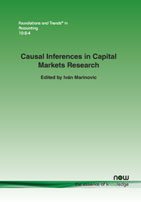Comments and Observations Regarding the Relation Between Theory and Empirical Research in Contemporary Accounting Research
Qi Chen, Duke University, The Fuqua School of Business, USA, qc2@duke.edu , Katherine Schipper, Duke University, The Fuqua School of Business, USA, schipper@duke.eduAbstract
We offer some thoughts on the relation between theoretical and empirical accounting research in the context of causal inference, in response to two questions posed by Professor Ivan Marinovic, organizer of the 2014 Stanford University Graduate School of Business Causality conference. The two questions are: should causal inference be the objective of accounting research; and what is, and what should be, the relation between theory and empirical research in accounting? With regard to the latter, we point to two sources of difficulty: (1) confusion and disagreement about interpretation, advantages and disadvantages of various empirical identification strategies; and (2) a lack of progress on the part of empirical researchers in testing the implications of existing accounting theories and thereby providing discipline to those theories. We argue that published empirical accounting research relies too much on insufficiently precise verbal models or generic models that provide few or no new accounting-specific insights and tends to ignore recent advances made by theoretical researchers. As a result analytical models in accounting research are not sufficiently challenged by empirical research and analytical researchers have made slow progress in establishing a meaningful distinction between accounting information and other types of information provided by firms and their managers. Our concern is that accounting research is in danger of losing the healthy disciplining balance between theory and empirical research that is essential to any scientific field. Without this balance, the profession becomes a discipline of beliefs, rather than a discipline of scientific discovery.
Causal Inferences in Capital Markets Research
This article is included as a chapter in Causal Inferences in Capital Markets Research.
Causal Inferences in Capital Markets Research is an attempt to promote a broad interdisciplinary debate about the notion of causality and the role of causal inference in the social sciences.
At the risk of oversimplifying, the issue of causality divides the accounting research community in two polar views: the view that causality is an unattainable ideal for the social sciences and must be given up as a standard, and the view that, on one hand, causality should be the ultimate goal of all scientific endeavors and, on the other hand, theory and causal inference are inextricable. Reflecting and discussing these views was the main motivation for this volume. This volume contains eight articles on three topics: I) Econometrics; III) Accounting, and III) Finance.
First, Nancy Cartwright addresses the problem of external validity and the reliability of scientific claims that generalize individual cases. Then, John Rust discusses the role of assumptions in empirical research and the possibility of assumption-free inference. Peter Reiss considers the question how sensitive are instrumental variables to functional form transformations. Finally, Charles Manski studies the logical issues that affect the interpretation of point predictions.
Second, Jeremy Bertomeu, Anne Beyer and Daniel Taylor provide a critical overview of empirical accounting research focusing on the benefits of theory-based estimation, while Qi Chen and Katherine Schipper consider the question whether all research should be causal and assess the existing gap between theory and empirical research in accounting.
Third, R. Jay Kahn and Toni Whited clarifies and contrasts the notions of identification and causality, whereas Ivo Welch adopts a sociology of science approach to understand the consequences of the researchers’ race for discovering novel and surprising results.
This volume allows researchers and Ph.D students in accounting, and the social sciences in general, to acquire a deeper understanding of the notion of causality and the nature, limits, and scope of empirical research in the social sciences.

Companion
Causal Inferences in Capital Markets Research: Preface
, Foundations and Trends® in Accounting, Volume 10, Issue 2-4 10.1561/1400000040
This preface by editor I. Marinovic also appears in this special issue.
Companion
From Casual to Causal Inference in Accounting Research: The Need for Theoretical Foundations
, Foundations and Trends® in Accounting, Volume 10, Issue 2-4 10.1561/1400000044
This article by J. Bertomeu et al. also appears in this special issue.
Companion
Where’s the Rigor When You Need It?
, Foundations and Trends® in Accounting, Volume 10, Issue 2-4 10.1561/1400000045
This article by N. Cartwright also appears in this special issue.
Companion
Interpreting Point Predictions: Some Logical Issues
, Foundations and Trends® in Accounting, Volume 10, Issue 2-4 10.1561/1400000047
This article by C. F. Manski also appears in this special issue.
Companion
Just How Sensitive are Instrumental Variable Estimates?
, Foundations and Trends® in Accounting, Volume 10, Issue 2-4 10.1561/1400000048
This article by P. C. Reiss also appears in this special issue.
Companion
Mostly Useless Econometrics? Assessing the Causal Effect of Econometric Theory
, Foundations and Trends® in Accounting, Volume 10, Issue 2-4 10.1561/1400000049
This article by J. Rust also appears in this special issue.
Companion
Plausibility: A Fair & Balanced View of 30 Years of Progress in Ecologics
, Foundations and Trends® in Accounting, Volume 10, Issue 2-4 10.1561/1400000050
This article by I. Welch also appears in this special issue.
Companion
Identification with Models and Exogenous Data Variation
, Foundations and Trends® in Accounting, Volume 10, Issue 2-4 10.1561/1400000051
This article by R. J. Kahn and T. M. Whited also appears in this special issue.
Companion
Foundations and Trends® in Accounting, Volume 10, Issue 2-4 Causal Inferences in Capital Markets Research: Articles Overiew
See the other articles that are part of this special issue.